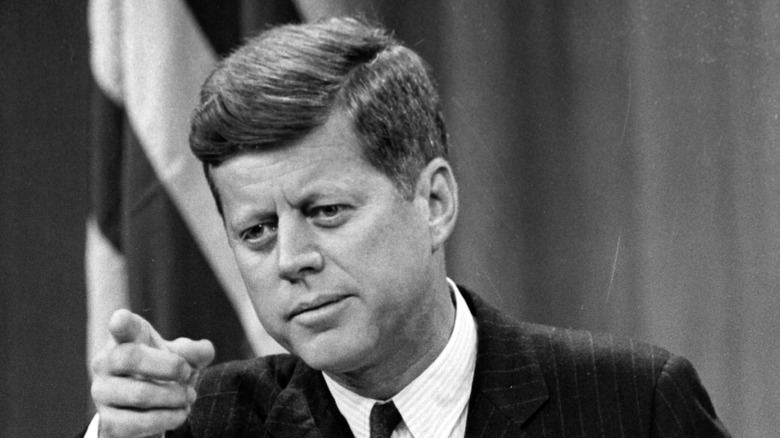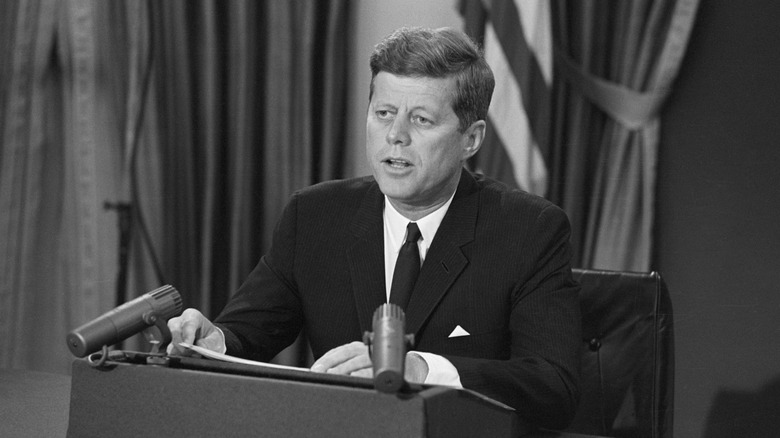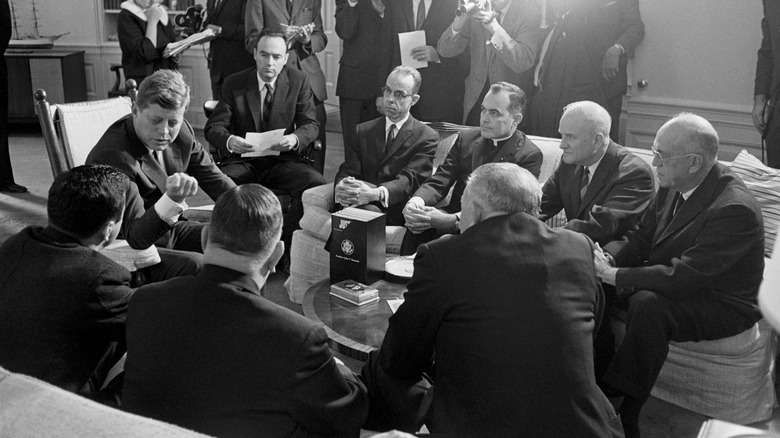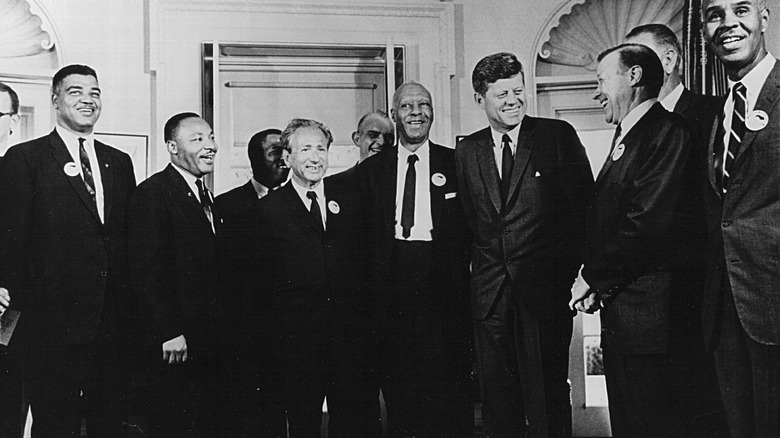The Myth About JFK You Should Never Believe
Western culture has a tendency to lionize its public figures, lauding their accomplishments and driving them to a mythic status that makes them appear larger than life. And no one person from the 20th century was more mythologized than President John F. Kennedy, who was assassinated as his motorcade cruised through Dallas, Texas, on November 22, 1963. The killing sent shockwaves across the world, launching a bevy of conspiracy theories as to who was really responsible and raising Kennedy to the status of martyr in the process.
Kennedy, who was just 46 when he was killed, had achieved a great deal in his short lifetime. Hailed as a war hero despite being plagued by illness and chronic back pain in early life, he became an acclaimed author after returning from serving in the military, before becoming a U.S. Congressman at the age of just 29. He served three terms in the House of Representatives before becoming a Senator in 1952, and winning the Presidency in 1960 at the age of 43, the youngest person ever to do so. He was instrumental in bringing an end to the Cuban Missile Crisis which historians argue was the closest the world ever came to the start of a nuclear war.
In the wake of his untimely death three years into his term, Kennedy was held up as a bastion of progressive values, his murder coming at a time when the Civil Rights Movement was at its peak. But was Kennedy really the keen and valuable ally that some suggest he was? The facts say otherwise, suggesting that Kennedy may have been forced to bring Civil Rights legislation to Congress during his presidency due to external political factors, rather than his wish to see all Americans receive equality as quickly as possible.
Pressure on Kennedy for Civil Rights legislation
John F. Kennedy's rise to the Presidency of the United States at an incredibly young age was secured with the help of Black American voters, who became convinced that the Democrat was the likeliest White House candidate to effect real change. By 1960, the Civil Rights Movement was starting to attract real attention and was on the cusp of forcing real political change. Under the leadership of Baptist Minister Dr. Martin Luther King Jr., who had been campaigning against racial segregation since the mid-1950s, the movement had captured the imagination of millions of Black Americans who wanted to see America emerge from the 20th century as a place of true equality.
Prior to JFK winning the presidency, the Kennedy family had accrued cachet among Civil Rights supporters for helping to free King after his arrest for protesting in Atlanta, Georgia, which led to King's father publicly endorsing Kennedy for the presidency. The Democratic candidate received nearly 70% of the Black American vote, which in turn effectively tied Kennedy to make progress on the issue of equality or risk alienating his Black voter base.
Kennedy feared losing Congress
But the truth was that Kennedy's Congressional majority was razor thin, and he was cautious about moving too quickly with legislation for fear of losing political support from Congress members in the South, where the idea of desegregation remained highly controversial. Kennedy was reportedly intending to pass over Civil Rights legislation until his second term (if he should get it), and use his first to address other issues which were less likely to drain him of executive power.
However, events such as the Rosa Parks-inspired Freedom Rides, the brutal use of police violence against Black people — including children — by Birmingham City Commissioner Eugene "Bull" Connor in Alabama, and the physical attempt of Governor George Wallace to attempt to prevent Black students from entering the desegregated University of Alabama forced the Kennedy administration's hand. Despite his misgivings regarding its potential impact on his presidency, in June 1963, Kennedy delivered a landmark public address telling America that he was readying what would eventually become the Civil Rights Act.
Kennedy and the March on Washington
After Kennedy's Civil Rights bill was brought to Congress, Civil Rights leaders saw the value in accompanying the legislative process, which can be long and arduous, with a large-scale public event to make visual public support for real change. Inspired by A. Philip Randolph and his supporters' planned 1941 march to the U.S. capital to challenge racial discrimination in the military, Martin Luther King Jr. and his fellow Civil Rights campaigners began planning the "March on Washington for Jobs and Freedom." The large-scale public event was to reach a climax with speeches from leaders including King, as well as musical performances by high-profile supporters such as Marian Anderson, Joan Baez, Bob Dylan, and Mahalia Jackson. The event attracted more than 250,000 demonstrators.
But despite his public support for Civil Rights and his government facilitating desegregation in various walks of life in numerous states, Kennedy was uncomfortable with the march. According to the JFK Library, he was worried that the March on Washington might impede the Civil Rights legislation he was already attempting to pass through Congress and failed to publicly support the event. Nevertheless, the event was peaceful, and culminated in King's "I Have a Dream" speech, which has become the defining message of the movement. Kennedy met with leaders of the march in the Oval Office later that day.
Sadly, the event failed to stop violence against Black Americans, and Kennedy was killed three months later without his Civil Rights legislation having been passed. That finally occurred the following year under Lyndon B. Johnson, and the Voting Act came a year later in 1965. Kennedy's death arguably allowed Johnson to garner bipartisan support for Civil Rights legislation that Kennedy himself saw as difficult to achieve during his tragically short presidency.



